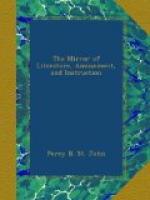Having parted, at Milan, with Lord John Russell, whom I had accompanied from England, and whom I was to rejoin, after a short visit to Rome, at Genoa, I made purchase of a small and (as it soon proved) crazy travelling carriage, and proceeded alone on my way to Venice. My time being limited, I stopped no longer at the intervening places than was sufficient to hurry over their respective wonders, and, leaving Padua at noon on the 8th of October, I found myself, about two o’clock, at the door of my friend’s villa, at La Mira. He was but just up, and in his bath; but the servant having announced my arrival, he returned a message that, if I would wait till he was dressed, he would accompany me to Venice. The interval I employed in conversing with my old acquaintance, Fletcher, and in viewing, under his guidance, some of the apartments of the villa.
It was not long before Lord Byron himself made his appearance, and the delight I felt in meeting him once more, after a separation of so many years, was not a little heightened by observing that his pleasure was, to the full, as great, while it was rendered doubly touching by the evident rarity of such meetings to him of late, and the frank outbreak of cordiality and gaiety with which he gave way to his feelings. It would be impossible, indeed, to convey to those who have not, at some time or other, felt the charm of his manner, any idea of what it could be when under the influence of such pleasurable excitement as it was most flatteringly evident he experienced at this moment.
I was a good deal struck, however, by the alteration that had taken place in his personal appearance. He had grown fatter both in person and face, and the latter had most suffered by the change, having lost, by the enlargement of the features, some of that refined and spiritualized look that had, in other times, distinguished it. The addition of whiskers, too, which he had not long before been induced to adopt, from hearing that some one had said he had a “faccia di musico,” as well as the length to which his hair grew down on his neck, and the rather foreign air of his coat and cap,—all combined to produce that dissimilarity to his former self I had observed in him. He was still, however, eminently handsome; and, in exchange for whatever his features might have lost of their high, romantic character, they had become more fitted for the expression of that arch, waggish wisdom, that Epicurean play of humour, which he had shown to be equally inherent in his various and prodigally gifted nature; while, by the somewhat increased roundness of the contours, the resemblance of his finely formed mouth and chin to those of the Belvedere Apollo had become still more striking.




